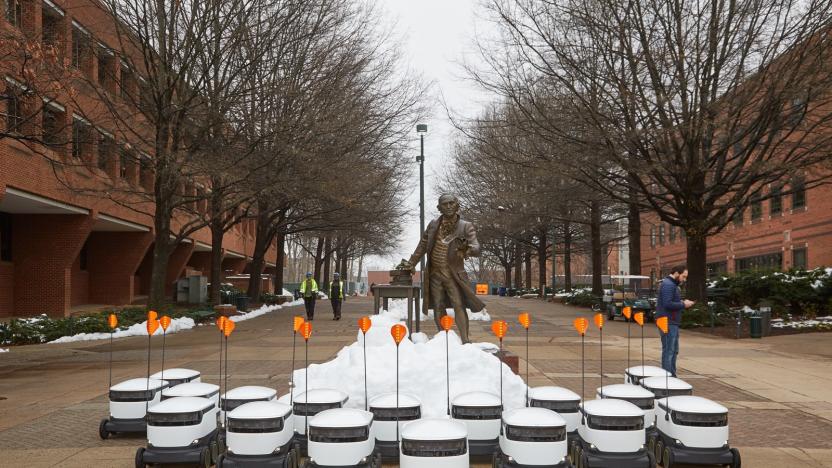GeorgeMasonUniversity
Latest

Starship robots will deliver pizza and coffee to George Mason students
It just became that much easier for students to grab food without interrupting a study break. Starship and Sodexo have launched a robot food delivery service at Virginia's George Mason University, giving students and staff access to food within an average of 15 minutes or less. Pay $2 through Starship's mobile app and one of the more than 25 automatons will deliver pizza, coffee and other grub to a convenient pickup point on campus. It even ties into the school's student meal plans (the first such tie-in anywhere, according to Starship) and debit program.

DARPA Innovation House project wants teams to take imaging data, see the big picture
Where are the bad guys? The military has eyes and ears everywhere these days, including drones large and tiny, satellites, radar imaging, LIDAR, infrared, thermal and even the enemy's own cellphones. The problem is how to take all that imaging and create a single picture of the environment. To that end, DARPA and George Mason University in Arlington have created the first Innovation House Project, which will put eight teams together for eight weeks in a "crucible-style" living environment to try to invent new ways of crunching the diverse sensor info. The military's research arm wants those units to think way off-piste "without fear of failure" to dream up solutions, and will have access to specialists and mentors from the military and academia. Unlike DARPA's usual challenges which have a grand prize, all teams accepted to the project will receive $30,000 in funding, but groups who go on to survive a four week cut will get an additional $20K. Proposals will be accepted up to July 31 (with no academic credentials needed), and the competition will begin in earnest on September 17. DARPA will get a license of any software created, allowing teams to hold the rights -- and hopes to continue the concept down the road, with new themes for team-based research on a tight deadline. So, if you're a data, imaging or "geospatial" whiz -- and don't mind being locked in a house and put under the brainstorming gun by DARPA -- check the PR for all the details.

Sun's coronal ejections caused by magnetic ropes, galactic weathermen to predict solar storms?
Space weather gets nasty when the sun starts shooting plasma into the cosmos, and these solar storms wreak havoc on both satellites and gadgets here on earth. Scientists want to predict the sun's eruptions so we can protect our gear (and know the best time to go tanning), and George Mason University researchers have made a discovery that may help us do so. By examining images from NASA's Solar Dynamic Observatory spacecraft, Professor Jie Zhang and grad student Xin Cheng determined that magnetic ropes are causing coronal ejections. The ropes are formed by several magnetic fields wrapped around each other, and scientists believe they can carry electrical currents strong enough to cause the plasma bursts. Prior to an eruption, Zhang observed a low-lying channel with unique electromagnetic properties (believed to be a magnetic rope) heat a portion of the sun's surface up to 10 million degrees. Once hot enough, the spot spewed forth copious amounts of the plasma and magnetic energy that gives GPS units and phones fits. Now that we know what gets Helios all riled up, we just need to find a way to calm him down. Close-ups of the sun in its tizzy are after the break.

Google helps scholars mine 1.7 million Victorian era book titles for clues to our historical attitudes
Whether we like, loathe, or never even considered the idea of it, quantitative literary analysis seems ready for its moment in the spotlight. Dan Cohen and Fred Gibbs, a pair of historians of science over at George Mason University, have been playing around with the titles of some nearly 1.7 million books -- accounting for all the known volumes published in Britain during the 19th century -- in a search for enlightenment about the Victorian era's cultural trends and developments. By looking at how often certain words appear in text titles over time, they can find corroboration or perhaps even refutation for the commonly held theories about that time -- although they themselves warn that correlation isn't always indicative of causation. Their research has been made possible by Google's Books venture, which is busily digitizing just about every instance of the written word ever, and the next stage will be to try and mine the actual texts themselves for further clues about what our older selves thought about the world. Any bets on when the word "fail" was first used as a noun?


